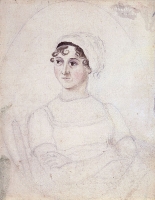阅读jiǎn · ào sī dīng Jane Austen在小说之家的作品!!! | |||||||
ào sī dīng chuàng zuò de xiǎo shuō, jīhū dū jīng guò cháng shí jiān de fǎn fù xiū dìng gǎi xiě。 tā chū bǎn de dì yī bù xiǎo shuō shì《 lǐ zhì yǔ qíng gǎn》 (1811)。《 ào màn yǔ piān jiàn》 (1813) shì tā de dì 'èr bù zuò pǐn。 zhè liǎng bù zuò pǐn, jiā shàng tā qù shì hòu chū bǎn de《 nuò sāng jué sì》 (1818), dū xiě yú shí bā shì jì de jiǔ shí nián dài, tōng cháng suàn shì tā de zǎo qī zuò pǐn。 ér《 màn sī fěi 'ěr dé zhuāng yuán》 (1814)、《 ài mǎ》 (1816) yǔ《 quàn dǎo》 (1818) zé xiě yú shí jiǔ shì jì, suàn shì hòu qī zuò pǐn。
gēn jù《 jiǎn míng bù liè diān bǎi kē quán shū》 de shuō fǎ, jiǎn . ào sī dīng shì “ dì yī gè xiàn shí dì miáo huì rì cháng píng fán shēng huó zhōng píng fán rén wù de xiǎo shuō jiā。 tā de zuò pǐn fǎn yìng liǎo dāng shí yīng guó zhōng chǎn jiē jí shēng huó de xǐ jù, xiǎn shì liǎo jiā tíng wén xué de kě néng xìng。 tā duō cì tàn suǒ qīng nián nǚ zhùjué cóng liàn 'ài dào jié hūn zhōng zì wǒ fā xiàn de guò chéng。 zhè zhǒng zhuólì fēn xī rén wù xìng gé yǐ jí nǚ zhùjué hé shè huì zhī jiān jǐn zhāng guān xì de zuò fǎ, shǐ tā de xiǎo shuō bǎi tuō shí bā shì jì de chuán tǒng 'ér jiē jìn yú xiàn dài de shēng huó。 zhèng shì zhè zhǒng xiàn dài xìng, jiā shàng tā de jī zhì hé fēng qù, tā de xiàn shí zhù yì hé tóng qíng xīn, tā de yōu yǎ de sǎnwén hé qiǎo miào de gù shì jié gòu, shǐ tā de xiǎo shuō néng cháng qī xī yǐn dú zhě。 dāng shí ( shí jiǔ shì jì chū ) liú xíng kuā zhāng xì jù xìng de làng màn xiǎo shuō, yǐ shǐ rén men suǒ yàn juàn, ào sī dīng de pǔ sù de xiàn shí zhù yì qǐ qīng xīn zhī fēng, shòu dào dú zhě de huān yíng。 dào 'èr shí shì jì, rén men cái rèn shí dào tā shì yīng guó shè zhèng wáng shí qī (1810-1820) zuì mǐn ruì de guān chá zhě, tā yán sù dì fēn xī liǎo dāng shí shè huì de xìng zhì hé wén huà de zhì liàng, jì lù liǎo jiù shè huì xiàng xiàn dài shè huì de zhuǎn biàn。 xiàn dài píng lùn jiā yě zàn pèi 'ào sī dīng xiǎo shuō de gāo chāo de zǔ zhì jié gòu, yǐ jí tā néng yú píng fán 'ér xiá zhǎi yòu xiàn de qíng jié zhōng jiē shì shēng huó de bēi xǐ jù de jīng zhàn jì qiǎo。 ”
Austen lived her entire life as part of a close-knit family located on the lower fringes of the English gentry. She was educated primarily by her father and older brothers as well as through her own reading. The steadfast support of her family was critical to Austen's development as a professional writer. Austen's artistic apprenticeship lasted from her teenage years until she was about thirty-five years old. During this period, she experimented with various literary forms, including the epistolary novel which she tried and then abandoned, and wrote and extensively revised three major novels and began a fourth.[B] From 1811 until 1816, with the release of Sense and Sensibility (1811), Pride and Prejudice (1813), Mansfield Park (1814) and Emma (1816), she achieved success as a published writer. She wrote two additional novels, Northanger Abbey and Persuasion, both published posthumously in 1818, and began a third, which was eventually titled Sanditon, but died before completing it.
Austen's works critique the novels of sensibility of the second half of the eighteenth century and are part of the transition to nineteenth-century realism.[C] Austen's plots, though fundamentally comic, highlight the dependence of women on marriage to secure social standing and economic security. Like those of Samuel Johnson, one of the strongest influences on her writing, her works are concerned with moral issues.
During Austen's lifetime her works brought her little personal fame and only a few positive reviews. Through the mid-nineteenth century, her novels were admired mainly by members of the literary elite. However, the publication of her nephew's A Memoir of Jane Austen in 1869 introduced her to a far wider public as an appealing personality and kindled popular interest in her works. By the 1940s, Austen had become widely accepted in academia as a "great English writer". The second half of the twentieth century saw a proliferation of Austen scholarship, which explored many aspects of her novels: artistic, ideological, and historical. In popular culture, a Janeite fan culture has developed, centred on Austen's life, her works, and the various film and television adaptations of them.
